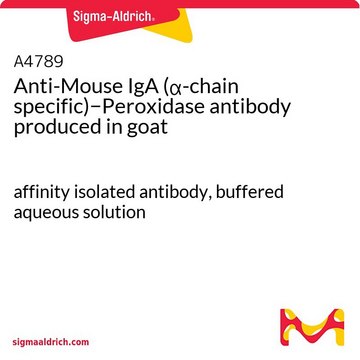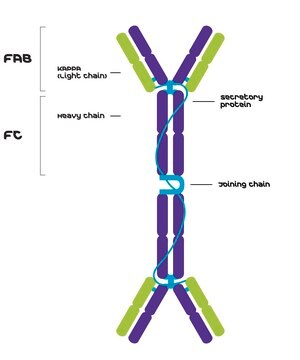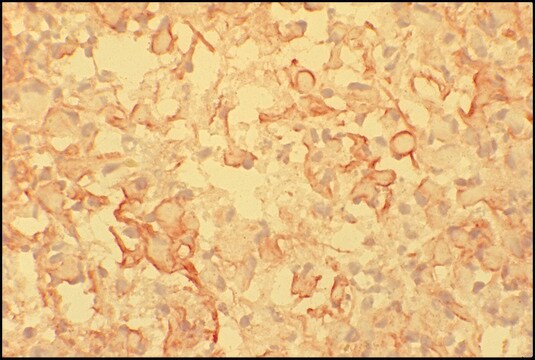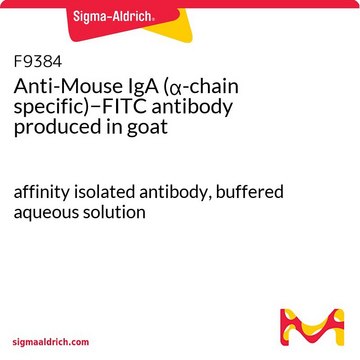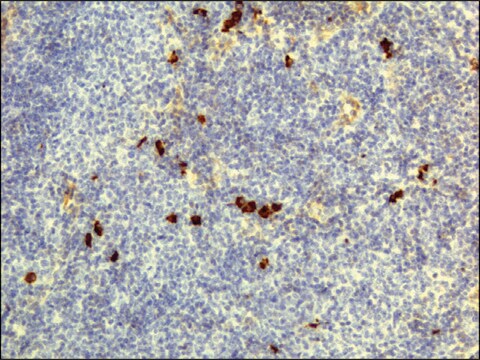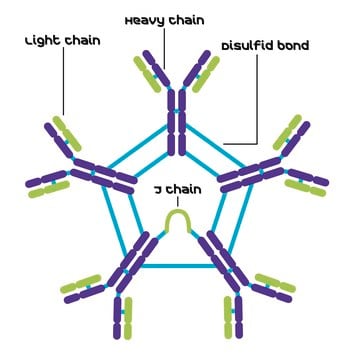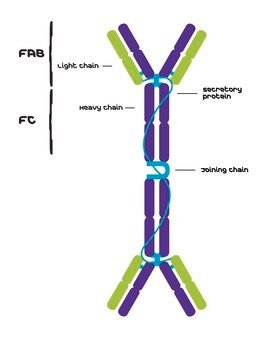M8769
Anti-Mouse IgA (α-chain specific) antibody produced in goat
affinity isolated antibody, lyophilized powder
Sign Into View Organizational & Contract Pricing
All Photos(1)
About This Item
Recommended Products
biological source
goat
Quality Level
conjugate
unconjugated
antibody form
affinity isolated antibody
antibody product type
secondary antibodies
clone
polyclonal
form
lyophilized powder
technique(s)
Ouchterlony double diffusion: suitable
storage temp.
2-8°C
target post-translational modification
unmodified
Physical form
Lyophilized from 0.01 M sodium phosphate, 0.015 M sodium chloride, pH 7.2
Reconstitution
Reconstitute with 0.135 M sodium chloride.
Disclaimer
Unless otherwise stated in our catalog or other company documentation accompanying the product(s), our products are intended for research use only and are not to be used for any other purpose, which includes but is not limited to, unauthorized commercial uses, in vitro diagnostic uses, ex vivo or in vivo therapeutic uses or any type of consumption or application to humans or animals.
Not finding the right product?
Try our Product Selector Tool.
Storage Class Code
11 - Combustible Solids
WGK
WGK 2
Flash Point(F)
Not applicable
Flash Point(C)
Not applicable
Personal Protective Equipment
dust mask type N95 (US), Eyeshields, Gloves
Choose from one of the most recent versions:
Already Own This Product?
Find documentation for the products that you have recently purchased in the Document Library.
J V M Lima-Filho et al.
Brazilian journal of medical and biological research = Revista brasileira de pesquisas medicas e biologicas, 37(7), 1005-1013 (2004-07-21)
An experimental infection with Salmonella enterica subsp. enterica serovar Typhimurium was evaluated in gnotobiotic mice previously exposed to a plasmid-free non-pathogenic Escherichia coli (EMO strain). Mice were exposed to EMO (experimental) or not (control) 10 days before challenge with Salmonella
Louise S Matheson et al.
International immunology, 21(8), 957-966 (2009-06-30)
Recently, we identified that diverse heavy chain (H-chain)-only IgG is spontaneously produced in light chain (L-chain)-deficient mice (L(-/-) with silenced kappa and lambda loci) despite a block in B cell development. In murine H-chain IgG, the first Cgamma exon, C(H)1
Ana A Bengoa et al.
Food research international (Ottawa, Ont.), 123, 48-55 (2019-07-10)
The use of Lactobacillus paracasei strains isolated from kefir grains as starters for the development of functional dairy products was evaluated. The physicochemical and immunomodulatory properties of milks fermented with L. paracasei CIDCA8339, CIDCA83123 and CIDCA83124 were analyzed. The three
A C Rodrigues et al.
Journal of applied microbiology, 89(3), 404-414 (2000-10-06)
The effect of Saccharomyces boulardii on the immune system was evaluated, comparing germ-free Swiss/NIH mice monoassociated with the probiotic with germ-free mice. Saccharomyces boulardii colonized the gut of germ-free mice and survived the gastrointestinal conditions. An increase in sIgA production
Marina N Matos et al.
Infection and immunity, 82(10), 4265-4275 (2014-07-30)
In this work we immunized mice with DNA encoding full-length Tc52 or its amino- or carboxy-terminal (N- and C-term, respectively) domain carried by attenuated Salmonella as a DNA delivery system. As expected, Salmonella-mediated DNA delivery resulted in low antibody titers
Our team of scientists has experience in all areas of research including Life Science, Material Science, Chemical Synthesis, Chromatography, Analytical and many others.
Contact Technical Service